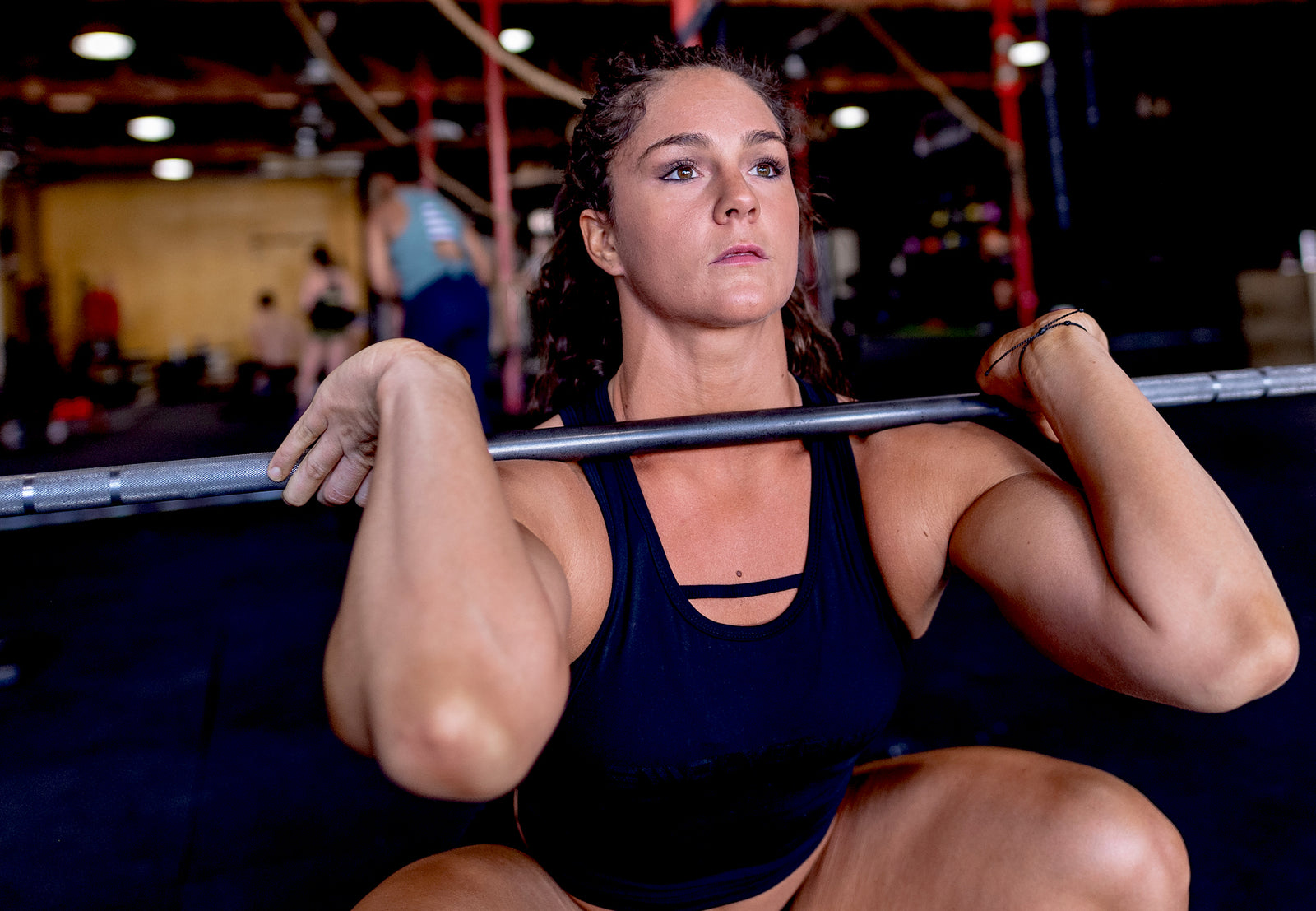By this time, a post title such as this has been discussed to nauseam across all platforms. While ‘Transformation Tuesday’ pics are plentiful, there are so many reasons beyond aesthetics for women to be lifting heavier weights. Since finding the sport of weightlifting over five years ago, I have gained so much more than physical mass. The gains between my ears are far greater than the gains around my quads. Did you know women lose 30% of lean mass between the ages of 50 and 80 [R]
Why does this matter?
Losses in lean muscle contribute to a decrease in balance, mobility, increased risk of falling, increased weight gain, and a decrease in overall quality of life. As a practicing physical therapist, I can attest to the fact that over 90% of the clients I see find themselves on a treatment table because of injuries that have been caused due to weakness. Why do muscles become tight? Why do joints find themselves out of place? The root cause of most injuries is an underlying weakness. Here are five reasons to reconsider the squat rack and why women should be lifting weights.
Why Women Should Lift Weights: Muscle Loss is the Greatest Age-Related Contributor to Decline in Metabolism
Yes, it’s true lifting weights can help you lose weight. Inactive adults experience a 3-8% loss of muscle mass per decade. Therefore, if you are an inactive 30-year-old woman who sits behind a desk the entirety of your career, leading a sedentary and inactive lifestyle, you will have close to a 25% reduction in muscle mass by the time you are 60 [R]. That is unreal.
With less lean muscle mass you will see a decline in resting metabolic rate and fat accumulation. Our metabolism is our bodies built in furnace; we want to do anything we can to keep that fire burning strong. Research has found that by adding two to four pounds of lean mass you have the potential to burn an additional 100 calories at rest. Weightlifting is truly the gift that keeps on giving. Unlike traditional cardiovascular training (think: running, spinning, stair climbing), when you train with weights you continue to burn calories following your workout, increasing your metabolic rate for up to 72 hours after your lifting session is over.

Why Women Should Lift Weights: Lifting Weights Can Reduce Pain
As a whole, clients in pain generally believe weightlifting is the absolute last thing that they should bed doing in order to decrease their symptoms. As mentioned earlier much of our pain stems from underlying weakness, compensation issues, and poor movement patterns developed over time. A systematic review explored research on the effects of strength training and pain. Six studies were examined that conducted random control trials on women ages 18-65.
The interventions in these studies succeeded in increasing strength even when training was brief and low intensity. In all six studies the effects of training and pain was investigated [R]. Research found that pain decreased significantly per subjective reports in all strength training groups for those that reported pain at the beginning of the study. Pain reduction was seen in women who had very active and physical jobs and women who were more sedentary in the workplace.
Why Women Should Lift Weights: Lifting Weights Can Prevent Osteoporosis
Another overarching reason, why women should be lifting weight, is Osteoporosis. Osteoporosis is a major health epidemic caused by low bone mass increasing susceptibility to fractures in the hip, spine, and wrist. Weight-bearing exercises, with a particular emphasis on load and resistance, are important for the maintenance and improvement of bone health. In order for bone remodeling to occur, there must be mechanical stressors on bone tissue.
The absence of this important stimuli has been shown to increase bone loss and associated health costs. Resistance training has been shown to improve bone health on a much greater scale than pharmacological or nutritional management. This information has been examined and collected over 10 years and two dozen studies examining the relationship between resistance training and bone density [R].
Loading is an integral aspect to bone health as we age, without it one can almost be guaranteed they will be at risk for major medical issues down the road and all the associated costs that go along with that.
Why Women Should Lift Weights: Weightlifting Can Decrease Symptoms of Depression
Research from over 30 different studies was analyzed on the benefits of weightlifting to prevent and decrease symptoms of depression. Consistent resistance training two to five days a week has been found to deter depression and its symptoms [R]. The medical community has long understood the physiological benefits of cardiovascular exercise when it comes to examining running and cycling, but analysis of how weight training affects mental health is big news.
While these studies cannot tell us the exact science behind this conclusion (yet) I think most weightlifters can attest to this truth. Personally, weightlifting has consistently given me a more restful nights sleep, reduced anxiety, brought clarity, and gifted me with a self-confidence I never thought I would possess.

Why Women Should Lift Weights: Change your body, Change Your Mindset
While there is no argument that physically, lifting weights is exponentially beneficial, the mental gains attained need a platform all to their own. Overcoming the daunting task of bringing a heavyweight from the ground to overhead brings growth far, far away from the gym doors. Accomplishments under the barbell lead to increased confidence in literally every facet of life. Studies show that weightlifting improves sleep, reduces chronic fatigue, and helps with substance abuse [R].
There are so many reasons beyond physical appearance when it comes to lifting weights along with a growing body of research supporting these claims. Finding the right coach that can help you lift safely and effectively, remains the last task when deciding if weightlifting is right for you.
Why Women Should Lift Weights: The Takeaway
I so often hear women saying, ‘they aren’t very strong’ and 'they will never lift as much as the athlete standing next to them.’ What goes unrealized is that they are doing so much more for their bodies and minds by just showing up and building a base brick by brick. In doing so, women are cultivating a better quality of life for decades down the road. That is a claim all the aforementioned research supports and the real reason to get under a barbell, and why you should be lifting weights.
About The Author

SWOLVERINE is an endurance athlete and active lifestyle brand. Made for the elite athlete, and the strong-willed our products were designed to fuel your athletic performance. We perform when you perform.
We believe that everyone can optimize not only their athletic performance but their human potential. The way we believe we can optimize performance is through transparency, clinically effective doses, and clinically proven ingredients with evidence-based outcomes. We provide the nutrients you need to power your active lifestyle.
References
1. Kalyani, R. R., Corriere, M. & Ferrucci, L. Age-related and disease-related muscle loss: The effect of diabetes, obesity, and other diseases. Lancet Diabetes Endocrinol. 2014, https://www.ncbi.nlm.nih.gov/pmc/articles/PMC4156923/
2. Layne, J E, and M E Nelson. “The Effects of Progressive Resistance Training on Bone Density: a Review.” Current Neurology and Neuroscience Reports., U.S. National Library of Medicine, Jan. 1999, www.ncbi.nlm.nih.gov/pubmed/9927006
3. Deutscher Ärzteverlag GmbH, Redaktion Deutsches Ärzteblatt. “Strength Training for Women as a Vehicle for Health Promotion at Work (30.06.2017).” Deutsches Ärzteblatt, 2017, www.aerzteblatt.de/int/archive/article/191927
4. Layne, J E, and M E Nelson. “The Effects of Progressive Resistance Training on Bone Density: a Review.” Current Neurology and Neuroscience Reports., U.S. National Library of Medicine, Jan. 1999, www.ncbi.nlm.nih.gov/pubmed/9927006
5. Gordon, Brett R., et al. “The Effects of Resistance Exercise Training on Anxiety: A Meta-Analysis and Meta-Regression Analysis of Randomized Controlled Trials.” SpringerLink, Springer, 17 Aug. 2017, link.springer.com/article/10.1007/s40279-017-0769-0
6. Westcott, W L. “Resistance Training Is Medicine: Effects of Strength Training on Health.” Current Neurology and Neuroscience Reports., U.S. National Library of Medicine, 2012, www.ncbi.nlm.nih.gov/pubmed/22777332












